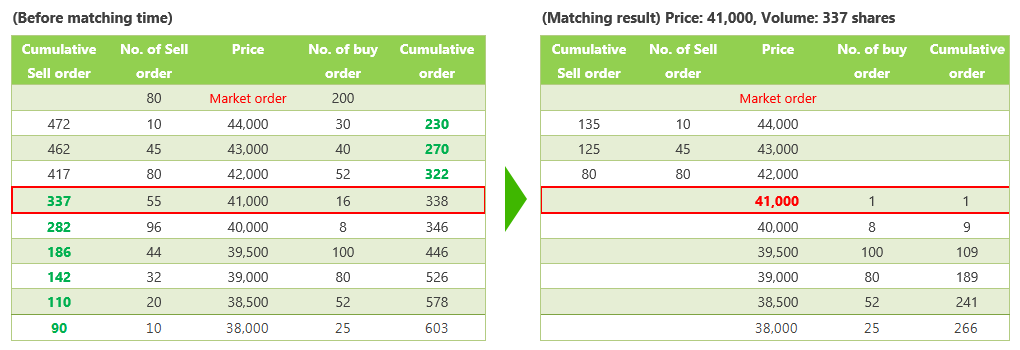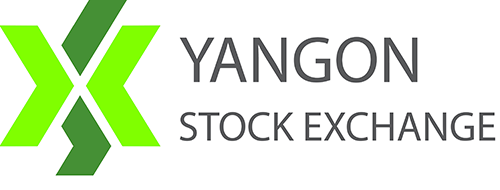Home > Trading > Trading procedure (For Local)
Trading procedure (For Local)
YSX, as a stock exchange, is a venue to provide opportunities to investors to buy or sell listed company’s shares. Investors have to send their buying or selling orders to YSX through securities companies having securities license issued by SECM as well as trading qualification provided by YSX.


Getting ready
Choosing a securities company
-
Choosing a securities company, having securities license and trading qualification, for opening a securities account.
-
Investors to be able to open securities accounts with several securities companies.
Bank account
-
Opening a bank account with banks designated by a chosen securities company if an investor hasn’t opened the bank’s account.
-
Depositing or transferring cash to his/her bank account and customers bank account of a securities company.
Securities account
-
Entering into an agreement on a securities account opening with chosen securities company and opening an account.
Investment decision
-
To decide, sometimes with receiving investment advice from securities companies, which stocks, how match price, how many shares and what timing an investor places buy/sell order, through a securities company, on YSX.
-
The final investment decision should be done by an investor and the investor has responsibility for the decision of stock trading and order placement by himself/herself.
Stock trading rules
After opening bank and securities accounts, an investor is able to send buying/selling orders under following stock trading rules stipulated in the Trading Business Regulations:
Trading hours
| Order acceptance time | 9:30 am to 1:00 pm |
| Matching time | 10:00 am, 10:30 am, 11:00 am, 11:30 am,
12:00 pm, 12:30 pm and 1:00 pm |
Order types
-
Market order
-
A market order is an order placed without specifying the buying or selling price.
-
Even though a market order has price priority than other limit orders and is likely to be executed, the order has risk which an investor may buy or sell shares at his/her unexpected higher or lower matching price.
-
-
Limit order
-
A limit order is an order placed by specifying the price at which the trader seeks to buy or sell shares.
-
Even though an investor placing a limit order can avoid risk of buying/selling shares at unexpected price, an investor cannot buy/sell shares if a matching price is superior than his/her limit order price.
-
Price limit
-
To prevent too much volatility of stock prices, YSX sets daily price limit for all stocks of listed companies.
-
An upper and a lower limit price of the day is decided based on a level of a base price under the table stipulated in the Enforcement Regulations for Trading Business Regulations. A base price, in general, is the last matching price of a previous working day.
-
In case where a base price is MMK 35,000, an upper limit price becomes MMK 40,000 (MMK +5,000) and a lower limit price becomes MMK 30,000 (MMK -5,000)
(Excepted price limit table)
| Base price (MMK) | Price limit (MMK) | |
|---|---|---|
| From (≧) | Below (<) | |
| 2,000 | 4,000 | 500 |
| 4,000 | 10,000 | 1,000 |
| 10,000 | 20,000 | 2,500 |
| 20,000 | 40,000 | 5,000 |
| 40,000 | 100,000 | 10,000 |
| 100,000 | 200,000 | 25,000 |
Reference: Enforcement Regulations for Trading Business Regulations
Order unit and tick size
-
Order unit, which is a minimum amount of shares an investor is able to place on YSX’s order books of listed companies, is one (1) share.
-
A tick size is the minimum stock price movement of stocks of a listed companies and the tick size is decided based on tick size table stipulated in the Enforcement Regulations for Trading Business Regulations.
(Excepted tick size table)
| Order price (MMK) | Tick size (MMK) | |
|---|---|---|
| Above (>) | Up to (≦) | |
| 0 | 1,000 | 10 |
| 1,000 | 4,000 | 50 |
| 4,000 | 10,000 | 100 |
| 10,000 | 40,000 | 500 |
| 40,000 | 100,000 | 1,000 |
| 100,000 | 400,000 | 5,000 |
Reference: Enforcement Regulations for Trading Business Regulations
Matching methods
-
Price priority: The order price that is superior than other orders gets filled first and a market order has the first price priority.
-
Time priority: If the price priority is same, earlier order has priority to get filled first.
-
Call auction methods:
-
For each limit price recorded in the order book, the system calculates the cumulative amounts in each buy and sell order book side.
-
For a market order, each buy/sell market order is placed on the cumulative buy/sell order column of the upper limit price/lowest limit price with the superior price priority than the limit orders.
-
Comparing the totals of each order book side, a matching price is determined in the price allowing the largest number of stocks to be traded. Then, all the stocks are filled at this matching price.
-
If there are two candidate prices to be a matching price, a closer price with the last matching price or a base price becomes a matching price
-

Placing orders and order matching
-
An investor is able to send his/her orders, through a securities company, to YSX anytime during trading hours and orders are filled if the orders satisfy matching requirement mentioned above.
Trading demonstration video
Confirming order execution
-
After a matching time at 10:00 am,10:30 am,11:00 am,11:30 am, 12:00 pm,12:30 pm or 1:00 pm, an investor receives execution result of his/her orders through a securities company’s execution notice if his/her orders are executed.
-
Information of a matching price and volume of listed stocks is able to be seen on the YSX’s website.
Contact:
Market Department
Tel: 01-371167




